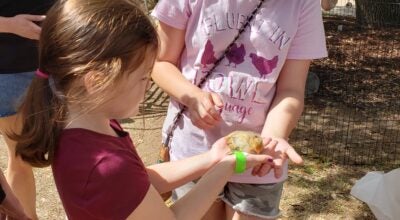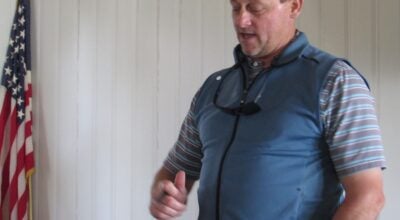GPS scavenger hunt growing in popularity
Published 11:35 pm Friday, November 28, 2008
Robert Mayben loves a good challenge, so when he first heard about a high-tech scavenger hunt using Global Positioning Systems (GPS) he was all for giving it a try.
Two years later, he and his wife, Magen, are avid Geocachers, devotees to a hobby that uses hand-help GPS devices to find boxes of swag — trinkets, toys, coins, novelty items, whatever.
Throughout Alabama, the country and the world, geocaching continues to gain momentum. Adventure-seekers of all ages are eager to locate and hide what are typically small, waterproof containers that hold a logbook and treasure of some kind — typically toys or trinkets.
There are more than 685,000 active geocaches worldwide, according to www.geocaching.com, which bills itself as the official global GPS cache hunt site.
“I was pretty much hooked on it,” Mayben said of his first time Geocaching. “A friend of mine, who is a teacher, came up to me at a summer workshop and said he had heard about geocaching and wanted to try it out with his students. Since I conduct teaching workshops for educators and he is part of a group of mine that meets regularly, I tried it out on them.”
Magen, a teacher at Demopolis Middle School, was part of a second group of teachers to take his workshop. The couple soon fell in love and were married a few months ago.
Together they have incorporated geocaching in their travels, teaching and as a weekend hobby.
“I wouldn’t say I am as fanatical as some of the geocachers out there. I’m not going to plan a trip around it unless it’s a day trip with friends,” he said. “I am not going to do it on my own. I do it mostly for the fun and fellowship.”
The game works through players setting up and concealing a cache, recording the GPS coordinates and posting them on www.geocaching.com.
Others use the coordinates to find the cache, which sometimes contains rewards — perhaps, a trinket or postcard.
If you take something out of a cache, you’re expected to leave something else in its place.
Successful players then sign the logbook, conceal the cache again and contact the Web site to tell the story of how they found it.
The point of geocaching is not so much what’s in the box, but the location of the box itself. The caches come in a variety of shapes and sizes and are found in all types of terrain.
And sometimes they’re pretty far off the beaten path. Caches can be everywhere from parking lots under lamp skirts to public parks, to the middle of rivers and in the middle of the woods.
Getting there isn’t always easy, and the cache can be well hidden.
“We kind of consider ourselves geocaching snobs,” said Mayben. “If there is something that does not make the cache itself unique, like it is really hard to find or you have to do something creative to have to find it, then we usually don’t try to find it.”
Placing a cache for others to find can be just as fun as finding them.
All you have to do it create a profile on geocaching.com, follow the guidelines from the website and then create a log of the coordinates of where the cache is.
“Some caches contain a simple rolled piece of paper where you sign that you have found it. Others include the trinkets and coins,” said Mayben. “It’s really a lot of fun, especially for the family.”
In addition to normal caches, Geocaches can find Puzzle Caches, in which one must solve a puzzle to earn the coordinates, multi-caches, where clues for the cache location are left in another cache, and night caches, which are only to be sought after dark. There are also trackable items like Travel Bugs, which Geocachers register on the site as having a mission.
For example, Mayben picked up a travel bug that was a cow, and made its mission to travel to where there were other cows. He took the cow to Idaho and took a picture of it facing a herd of cows there, then recorded the location for others to find. Collectible GeoCoins can also be an incentive for those who are the first to find a cache, or accomplish some other achievement.
In Demopolis, more than 300 caches have been planted and listed on Geocaching.com. Linden has nearly 250 caches.
“People here would probably be very surprised at how many visitors to Demopolis we have who come here specifically to find the caches,” said Mayben.
“There is one by the boat ramp in Demopolis at the river called, ‘HELP…I have fallen…and I can’t get up’. The cache is down in the bottom of a tube and you have to figure out how to get it up. It’s a great way to be outside, to actually be searching for something and it takes you to places you might not get to see otherwise.”
Besides Alabama, the Maybens have found caches in Scotland, the Tower of London, the Lake District in England, Texas, Georgia, Mississippi and Tennessee.
“One of our goals is try to get a cache in all of the different states,” said Magen.
Each spring, Magen holds a GPS scavenger hunt for her seventh grade students at Foscue Park in Demopolis.
“It’s not for everybody,” said Mayben. “You have some couples that do it, families that do it, grandparents who do it with their grandkids, school classes do it. For some people it’s their fishing, or golf. It’s their hobby. You can make it fit your own schedule or interest.”





